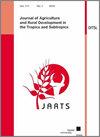Biofuels and livelihoods: Empirical findings on the welfare impacts of Jatropha cultivation in the Mangochi district, Southern Malawi
Q3 Social Sciences
Journal of Agriculture and Rural Development in the Tropics and Subtropics
Pub Date : 2019-12-02
DOI:10.17170/KOBRA-20191030734
引用次数: 2
Abstract
This study evaluates the welfare impacts of jatropha ( Jatropha carcus ) cultivation measured as consumption expenditure per adult-equivalent for smallholders in southern Malawi. Household survey data from the southern region of Malawi collected in 2014 from 303 smallholders using purposive and random selection strategies were used. Propensity score matching and endogenous switching regression methods were employed to address the selection bias problem and to control for observed and unobserved covariate effects. The analysis suggests that when selection bias and endogeneity were accounted for, jatropha cultivating farmers' welfare was lower as compared to their counterparts. In the absence of tangible empirical evidence on welfare benefits to smallholder jatropha feedstock producers, this study concludes that jatropha is unlikely to bring meaningful welfare benefits to smallholders. As such, further research should consider pursuing other potential biofuel options like ‘moringa” for biodiesel in the future Malawi biofuels policy. These findings also show that biofuels are not a panacea to the rural development and welfare of smallholders. Rather, the results suggest that programme initiatives which build household assets need to be encouraged to improve the plight of rural households largely dependent on agriculture.生物燃料和生计:马拉维南部Mangochi地区麻风树种植对福利影响的实证研究结果
这项研究评估了麻疯树(jatropha carcus)种植对马拉维南部小农户的福利影响,该影响以每成年当量的消费支出衡量。使用了马拉维南部地区2014年通过有目的和随机选择策略从303名小农户那里收集的家庭调查数据。采用倾向评分匹配和内生切换回归方法来解决选择偏差问题,并控制观察到和未观察到的协变量效应。分析表明,当考虑到选择偏差和内生性时,麻风树种植农民的福利低于同行。在缺乏关于麻疯树原料生产者小农户福利的具体经验证据的情况下,本研究得出结论,麻疯树不太可能给小农户带来有意义的福利。因此,进一步的研究应该考虑在马拉维未来的生物燃料政策中寻求其他潜在的生物燃料选择,如生物燃料的“辣木”。这些发现还表明,生物燃料并不是农村发展和小农户福利的灵丹妙药。相反,研究结果表明,需要鼓励建立家庭资产的方案举措,以改善主要依赖农业的农村家庭的困境。
本文章由计算机程序翻译,如有差异,请以英文原文为准。
求助全文
约1分钟内获得全文
求助全文
来源期刊
CiteScore
2.30
自引率
0.00%
发文量
0
审稿时长
>36 weeks
期刊介绍:
The Journal of Agriculture and Rural Development in the Tropics and Subtropics publishes papers dealing with original research and review papers in the fields of plant production, animal nutrition and animal husbandry, soil science, rural economy and farm management, forestry and forest economy, veterinary hygiene and protection against epidemics.

 求助内容:
求助内容: 应助结果提醒方式:
应助结果提醒方式:


